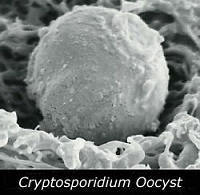Cryptosporidium

Cryptosporidium is a microbial pathogen found in surface water and groundwater under the influence of surface water. Although filtration removes Cryptosporidium, the most commonly used filtration methods cannot guarantee 100 percent removal.
During 2007, as part of our routine sampling, 12 monthly samples from our raw water conduit at our screen house were collected and analyzed for Cryptosporidium oocysts. Of these monthly samples one was confirmed positive. Therefore, our testing indicates the presence of Cryptosporidium in our source water.
Current test methods do not allow us to determine if the organisms are dead or if they are capable of causing disease. The Eleven additional monthly raw water samples were tested for Cryptosporidium oocysts but none were detected. All testing in 2008, to analyze for the presence of Cryptosporidium were negative.
Ingestion of Cryptosporidium may cause cryptosporidiosis, a gastrointestinal infection. Symptoms of infection include nausea, diarrhea, and abdominal cramps. Most healthy individuals can overcome disease within a few weeks. However, immuno-compromised people are at greater risk of developing life-threatening illness. We encourage immuno-compromised individuals to consult their health care provider regarding appropriate precautions to take to avoid infection. Cryptosporidium must be ingested to cause disease, and it may be spread through means other than drinking water.
Cryptosporidium is a parasite that lives and multiplies in the intestines of warm-blooded animals. Its eggs are shed through feces, where they can enter lakes, reservoirs and other sources of drinking water. When exposed to adverse conditions, these eggs can form a spore so rugged that they become impervious to even concentrated bleach.
Once the spore is ingested, an intestinal illness called Cryptosporidiosis may result. The incubation period may range from 1 – 12 days. Cryptosporidium can be spread by person-to-person, or animal-to person contact, and by drinking contaminated water.
Human Cryptosporidiosis was first reported in 1976. The primary symptom is acute diarrhea. Other symptoms include abdominal pain, vomiting, headache, loss of appetite and a low-grade fever.
Some persons infected with Cryptosporidium will not become ill, but others may be especially susceptible to Cryptosporidiosis. In most individuals with normal immune systems, symptoms generally persist for two weeks or less. But immunocompromised persons, including individuals receiving chemotherapy and kidney dialysis patients, persons on steroid therapy, and those with Crohn’s disease or HIV/AIDS, may have severe and long-lasting illness.
Properly operated water treatment procedures are effective in providing a barrier to Cryptosporidium and other pathogenic microorganisms from reaching the distribution system. Due to their high resistivity to chlorine, normal disinfection methods are ineffective against these parasites. Proper filtration of these small tough organisms, including the coagulation and sedimentation processes, is the most important vehicle in their control and elimination.
Cryptosporidium is spread through contact with fecal matter. One can minimize the risk of acquiring and spreading this parasite by cleansing hands after fecal contacts such as after toilet use, diaper changing and picking up pet waste. Since cattle are a common source, avoid drinking raw milk, and cleanse hands after contact with any farm animals. Avoid drinking unfiltered water, and comply with any water advisory issued by local and state authorities. If uncertain about the quality of a water supply, exposing water to a rolling boil for at least one minute will kill Cryptosporidium.
Bottled water, unless distilled or certified for cyst removal may contain Cryptosporidium. Current standards for bottled water do not guarantee that it be Cryptosporidium-free.
If home water filters are used, filters should have a pore size of less than 2 microns. Home filters should be certified for cyst removal by the National Sanitation Foundation (NSF; Standard #53)
